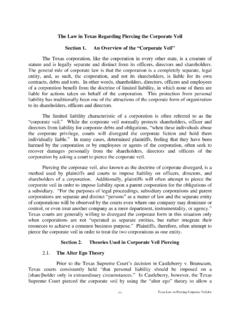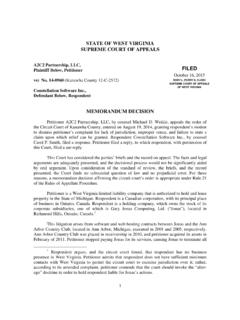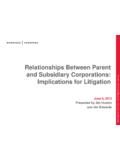Transcription of By: Jason R. Handal, Esq. Introduction
1 WHO IS RESPONSIBLE FOR AN LLC'S TAX LIABILTIES?1. By: Jason R. handal , Esq. Introduction The limited liability company ( LLC ) is a widely used entity in business, tax, estate and asset protection planning. An LLC offers a variety of benefits to its owners, including limited exposure to the entity's creditors and pass-through taxation. In the estate planning context, an LLC creates the opportunity for centralized management of investments and valuation discounts for both lifetime gifts and testamentary bequests. In Chief Counsel Advise 200235023 (8/30/2002), Mitchel Hyman, a Senior Technician Reviewer with the IRS, addressed questions related to the collection of tax liabilities from an LLC. This memo addresses five principal questions and includes a discussion of the reasoning behind the answers to those questions.
2 Below you will find a review of the questions and the highlights of the discussion. Questions Addressed in the Memorandum QUESTION 1: WHO IS LIABLE FOR THE TAX RESULTING FROM THE OPERATION OF A. MULTI-MEMBER LLC? This depends on the LLC's election. If the multi-member LLC elected to be taxed as a corporation, then the LLC is liable for the tax. If there has been no corporate election, then the multi-member LLC is taxed as a partnership, which means the members would be liable for the income tax, and the LLC. would be liable for the employment tax. However, unlike the typical partnership situation where the IRS (the Service ) asserts an employment tax liability against the partners who are liable for the debts of the partnership under state law, the Service will not assert an employment tax liability against the members of the LLC because they are not liable for the debts of the LLC under state law.
3 QUESTION 2: WHO IS LIABLE FOR THE TAX RESULTING FROM THE OPERATION OF A. SINGLE MEMBER LLC? This again will depend on the LLC's election. If the LLC elected to be taxed as a corporation, then the LLC is liable for the tax. The single member owner of the LLC and others may be liable for the trust fund recovery penalty under section 6672, depending on the facts and circumstances. If there has been no corporate election, then the LLC is disregarded for federal tax purposes and the single 1 This article is current as of 2002. Please contact Willms, for current information on this topic. 1. member owner is the taxpayer, which means the Service may recover the tax liability from the property of the single member owner, but the single member owner under state law has no interest in the assets of the LLC.
4 In short, the Service may not look to the LLC's assets to satisfy the tax liability of the single member owner. The Service, however, may take collection action against the single member owner's ownership interest in the LLC. QUESTION 3: IF THE SERVICE MAKES AN ASSESSMENT AGAINST A DISREGARDED. LLC, IS THAT A VALID ASSESSMENT AGAINST THE SINGLE MEMBER OWNER? An assessment made against a disregarded LLC is a valid assessment against the single member owner. QUESTION 4: IF THE SERVICE FILES A NOTICE OF FEDERAL TAX LIEN ( NFTL ). NAMING THE DISREGARDED LLC AS THE TAXPAYER, IS THAT A VALID NFTL. AGAINST THE SINGLE MEMBER OWNER? A NFTL identifying the disregarded LLC as the taxpayer may be a valid notice against the single member owner depending on the facts.
5 The IRS position is that a NFTL need not precisely identify the taxpayer; rather, the NFTL is valid if it substantially complies with the filing requirement so that constructive notice is provided to third parties. To avoid litigating this issue, IRS recommends the NFTL be filed in the name of the single member owner for the tax liabilities generated by the disregarded LLC. QUESTION 5: ARE THERE STATE LAW THEORIES THAT THE SERVICE COULD USE TO. COLLECT THE SINGLE MEMBER OWNER'S LIABILITY FROM THE DISREGARDED LLC? There are a variety of state law theories that the Service could use to collect a single member owner's tax liability from the disregarded LLC, including alter ego liability, nominee liability, or transferee liability.
6 Discussion Mr. Hyman notes that much confusion exists concerning collection issues involving LLCs. The memorandum addresses collection issues on two levels: considerations under the Internal Revenue Code and collection options under state law. Below are excerpts from Mr. Hyman's discussion, which address in greater detail the answers to the 5 questions, listed above. 2. LIABILITY AND COLLECTION UNDER THE INTERNAL REVENUE CODE. MULTI-MEMBER LLC. If it is determined that the LLC is a multi-member LLC, then the next consideration is whether the LLC is taxed as a corporation or a partnership. LLC TAXED AS A CORPORATION: If a multi-member LLC has elected to be treated as a corporation, then the IRS would apply the general rules of corporate taxation ( , the LLC.)
7 Is taxed as a corporation and the LLC members would be the equivalent of corporate shareholders). LLC TAXED AS A PARTNERSHIP: Most multi-member LLCs are taxed as partnerships because corporation status is not elected. Thus, an income tax liability arising from an LLC's activities flows through to its members. If the Service filed a NFTL to collect the income tax liability, then a partner's name as the taxpayer is listed on the NFTL. A major difference exists between a general partner's liability for the partnership's employment taxes and a member's liability when an LLC is treated as a partnership and incurs an employment tax liability. While each general partner is derivatively liable for the full amount of the employment tax liability under state law, no member of the LLC has any liability for the employment tax liability under state law.
8 Mr. Hyman emphasized that state law creates the difference in treatment between general partners and LLC members, not federal law. SINGLE MEMBER LLC. CORPORATE STATUS ELECTED: In a single member LLC situation, the IRS must determine whether an election has been made to have the LLC treated as a corporation for federal tax purposes. If such an election has been made, then the LLC will be treated as a separate legal entity that may accrue its own tax liability, and the Service may collect that liability only from the LLC's assets. This is the same result as when a multi-member LLC elects to be treated as a corporation. In essence, just as a sole corporate shareholder is not liable for the corporation's tax liability, the single member owner of the LLC would be similarly insulated from the LLC's federal tax liability.
9 DISREGARDED LLC: If the single member owner has not elected to treat the LLC as a corporation, then the default provision of the check-the-box regulations provides that the LLC is to be disregarded. Thus, the single member owner is the taxpayer for liabilities arising from the operation of the LLC. DISREGARDED LLCS: LIABILITY AND COLLECTION UNDER STATE LAW. The Service can rely on state law principles permitting a creditor to disregard a corporate business entity by piercing the corporate veil. If the corporate veil is pierced, then the 3. corporation and the taxpayer-owner are considered alter egos, and the liabilities of the owner may be collected from the corporation, or vice versa. Likewise the Service can, on a case-by-case basis, consider judicial collection of a tax liability of a member of a single member LLC from the LLC's assets, where there are sufficient grounds for piercing the LLC veil.
10 Moreover, the memo indicates that the fact that the LLC is disregarded under the check- the-box regulations for purposes of computing the taxpayer's tax liability may make the courts amenable to applying the alter ego/piercing the corporate veil concepts to the LLC. Mr. Hyman also discusses the theories of nominee liability and transferee liability under state law as alternatives to the alter-ego argument. If you would like to discuss the considerations listed above and how they might affect your or your client's planning, then please feel free to call us at (262) 238-6996 or email us at 4.



